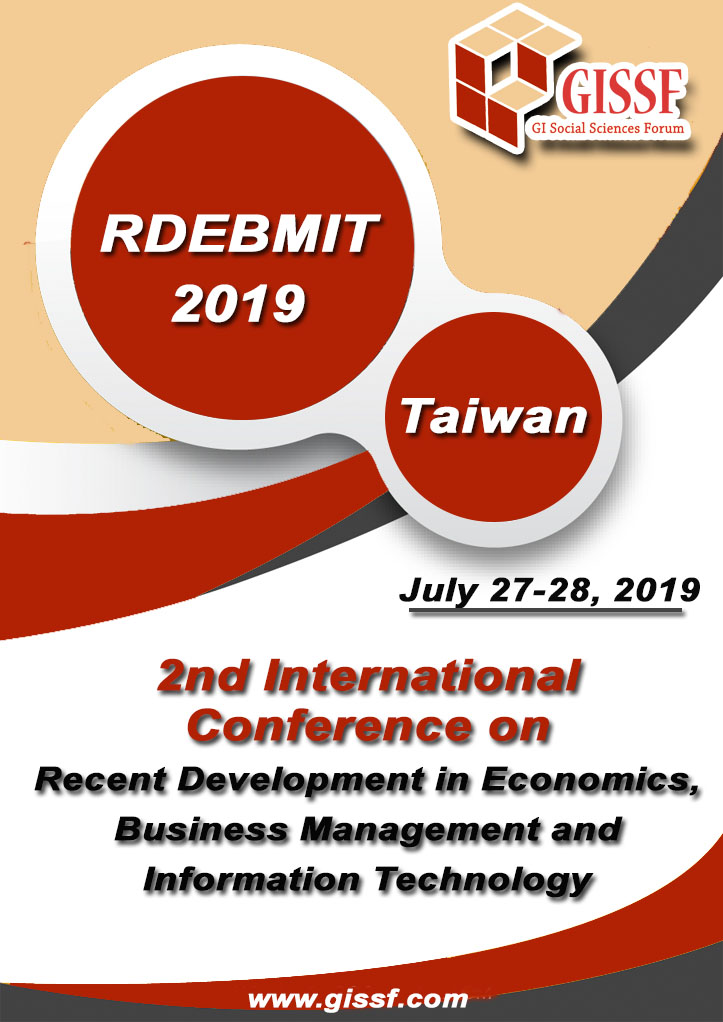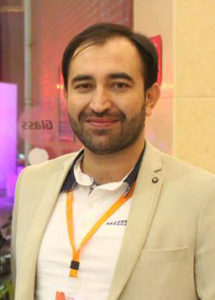Full Paper Submission Date: July 15, 2019
Early Bird Discount Date: March 30, 2019
Pay Registration Fee Through Credit Card
Submit Manuscript to: rdebmit@gissf.com
For Presenter registration: click here
For Attendee registration: click here
CALL FOR PAPERS
GISSF Research Wing announce the 2nd international conference on “Recent Development in Economics, Business Management and Information Technology”. This forum is established to discuss the issues of multidisciplinary field collaboration with business and economics emerging trends. We invite the scholars /scientists / engineers/ researchers / practitioners / students to join with us and share the new innovative trends in their respective field. This common platform is expected to provide the bases for joint venture among different fields to serve the society in a better way.
TO SUBMIT A PAPER:
1. Read through the track calls below and select the track which is closest to the topic of your paper. If you cannot decide that which track is suitable for your research topic, you can email the corresponding person with your title and a draft of your manuscript, for advice on rdebmit@gissf.com
2. Authors must submit papers electronically through the conference system by using online submission form or you can send it via email to rdebmit@gissf.com
3. All papers must follow the paper submission guidelines
All submitted abstracts/ papers / posters will go through a blind peer review process and accepted manuscripts will be published in conference proceedings. Conference proceeding will be submitted to ISI Thomson Reuters Web of Science for consideration and indexation.
Selected conference papers will be published in special / Scopus indexed journals associated with this conference. Associated journals will allocate a special / regular issue for papers submitted to this conference.
Invitation for Reviewers & Session Chairs in all fields
Voluntary participation as a reviewer and session chair will be acknowledged through a certificate by GISSF Wing.
GISSF Conference scope covers, but not limited to, the following topics:
Main Tracks of the conferences:
- Track1: Social and Community Studies
- Track2: Arts
- Track 3: Humanities
- Track 4: Civic and Political Studies
- Track 5: Cultural & Global Studies
SUBMISSIONS FOR DOCTORAL COLLOQUIUM ARE OPEN
In the practice of RDEBMIT 2019, the Doctoral Colloquium will take place during the main conference. The colloquium is for doctoral students seeking careers as researchers in public, private and academic organizations with research interests in multiple areas of research.
The aims of the RDEBMIT 2019 Doctoral Colloquium are:
- To develop and sustain a network of young scholars conducting high quality research.
- To support the upcoming generation of researchers by addressing issues relevant to the advancement of a research career
- To allow Students to discuss their research with leading specialists, scholars and peers in an international setting.
- To discuss the issues faced by students during their dissertation progress with the senior scholars across different fields and countries
The Doctoral Colloquium will Cover 4 major aspects. The first aspect will focus on introductions, networking and general mentoring. The second aspect will be based on group and individual research feedback sessions. The third aspect will be a colloquium poster session, providing students the opportunity to learn about one another’s research and prepare for the conference-wide poster session in which they will also participate. The fourth aspect is a question answer session between the students and professors to seek solutions for the student research issues.
Eligibility Criteria:
As the purpose of this colloquium is to support Students with their dissertation research, only Doctoral and Masters students who have not yet defended their dissertation are able to apply. Accepted colloquium participants must register for the main conference at the student rate. If student has already registered as a presenter or attendee, the entrance to student colloquium is free of charge. however the student has to confirm his/her appointment by sending email to rdebmit@gissf.com for participation in the colloquium.
CALL FOR PANEL PROPOSALS
Important Information:
1. Please submit your panel proposal to rdebmit@gissf.com
2. Panels will generally be 1 hour in duration. Time should be included for audience participation.
3. All participants must be registered for the overall RDEBMIT-2019 conference.
4. Please use the contents below for your panel proposal.
5. In case of further clarification or any assistance required before completing the proposal you can email at rdebmit@gissf.com
At least the moderator and two other panelists must be registered for the conference, so work on the schedule and proceedings can begin.
RDEBMIT 2019, Panel Proposal must include the following information:
1. Title: Title of your panel
2. Aims and Objectives of the Panel: Explain why such a panel is relevant to RDEBMIT and to the Theme of RDEBMIT. (Max 5-10 lines)
3. Occurrence/Novelty: Please describe either past instances or the novelty of new ventures here. (Max 10 lines)
4. Description: Use this to clarify scope, audience and focus. Give aims and objectives for your panel here. This will become the “abstract” for the proceedings and program. (Max 20-25 lines)
5. Event Structure/Agenda: Describe what organizers and participants will do during the panel. E.g., will there be a series of fixed presentations and then discussion, and/or will the moderator ask questions to which first the panelists and then the audience may respond. What are the main questions you would ask? (Max 20 lines).
6. Panel Members: List all names, affiliations, and emails of all anticipated panel participants, and state if they have accepted the invitation to participate should the panel be accepted. Include the moderator/organizer.
7. Qualifications of panelists: Briefly describe your and your fellow panelists’ backgrounds and qualifications/ areas of expertise in the related research/practitioner domain.
CALL FOR POSTERS
The RDEBMIT 2019 poster session will provide an opportunity for authors to interact informally with conference attendees, using a standard-size poster as a visual aid. Presenting a poster is also a good way to discuss and receive feedback on a work in progress that has not been fully developed into a paper. To facilitate this interaction, the RDEBMIT 2019 poster session will be held in conference common areas, where attention of the participants is expected to be high.
Poster proposal should be submitted consisting of an extended abstract, with a maximum of 250-300 words describing the research that would be the topic of the poster for presentation and discussion. You might include a small version of a figure or two that would be in the poster, such as a screen shot of a system you will be describing. Posters are submitted to a the conference. If your poster proposal is accepted, you will be notified and then you can prepare the actual poster which should be maximum of 45″x 60″.
CALL FOR SESSION MODERATORS
we invite scholars to become session moderators in the following tracks:
- Social and Community Studies
- Arts
- Humanities
- Civic and Political Studies
- Cultural & Global Studies
All interested scholars should send their consent to rdebmit@gissf.com by mentioning their area of interest. For this voluntary service, all session moderators will be awarded a certificate of appreciation by the RDEBMIT 2019 secretariat.
GUIDELINES FOR SESSION CHAIRS
In this 2nd International Conference “Recent Development in Economics, Business Management and Information Technology” several sessions will be held based on different themes and areas of interest.
- Session chairs are requested to kindly check the Schedule of conference.
- Check the date, room and time of the sessions that they are chairing.
- Main task of session chair is to motivate the presenter/researcher to share his/her knowledge on the particular topic and also make conducive environment so the participants may have an intellectual discussion on the subject.
- Session chair can share his/her own knowledge, research, experience, observations very briefly if time permits.
- Please ensure your availability at assigned room at least 5-10 minutes prior to the beginning of session. This will help you to acquaint with the working of Laptop and multimedia etc. Please contact the control room, in case of any problem.
- Please choose your seat in front row, so participant may see and interact with you easily.
- Please introduce yourself and greet the participants of session.
- Make attendance of presenters of your session to ensure their presence in the room.
- Make an announcement regarding the allocation of time to each presenter. Time for each presentation is of 10 minutes followed by 5 minutes of Question & Answer session. However, session chair may extend the time of presentation keeping in view the allotted time for session.
- Session chair is responsible for session to be completed on time.
- Before inviting presenter(s), announce their full name(s) and the title of the paper.
- Best session paper has already been decided by our distinguished reviewers and his/her name will be conveyed to you, you will announce this at the end of session and present a certificate to researcher.
- You will have to decide “Best Presenter of Session” by filling in the evaluation form provided to you and certificate will be awarded in the closing ceremony.
- At the end of session, distribute the certificates of presentation, convey expression of thanks on your personal and GISSF behalf to the presenters and the participants.
- In case of any sort of confusion, please contact conference chair or management of GISSF.
CALL FOR REVIEWERS
we invite scholars to become Reviewers in the following tracks:
- Social and Community Studies
- Arts
- Humanities
- Civic and Political Studies
- Cultural & Global Studies
All interested scholars should send their consent to rdebmit@gissf.com by mentioning their area of interest. For this voluntary service, all reviewers will be awarded a certificate of appreciation by the RDEBMIT 2019 secretariat.
PLAGIARISM POLICY
According to plagiarism policy of RDEBMIT-2019 all full papers considered for proceeding publication will go through plagiarism check using “TURNITIN” software and acceptable level of similarity index is 20%. Irrespective of initial abstract acceptance, full papers with more than 20% similarity indexed will not be published in online full paper proceeding. All authors are deemed to be individually and collectively responsible for the content of papers published by RDEBMIT-2019. Hence, it is the responsibility of each author to ensure that papers submitted to RDEBMIT-2019 should comply with the ethical standards with respect to plagiarism.
SUBMISSION GUIDELINES
REGISTRATION & FEE
IMPORTANT NOTE:
Registration fee is non-refundable and it includes charges for conference participation only. Arrangements and costs of visa, travelling and accommodation are not the responsibility of the organization, they will be borne by the individual author. We must receive the full Registration fee. Transaction cost will be borne by the authors.
Please clearly mention the paper ID on payment invoice and email the scanned copy at rdebmit@gissf.com
You may also pay the registration / publication fee through credit card by following the link below:
Pay Registration fee through Credit Card
| SR. No | International Delegates | Early Bird Fee (March 30, 2019) | Normal Fee |
|---|---|---|---|
| 1 | All Participants / Faculty members / Professionals / Practitioners | US$ 420 | US$ 475 |
| 2 | Student (must provide copy of student ID card) | US$ 315 | US$ 370 |
| SR. No | Taiwan Participants | Early Bird Fee (March 30, 2019) | Normal Fee |
| 3 | All Participants / Faculty members / Professionals / Practitioners | US$ 370 | US$ 420 |
| 4 | Taiwan Students (must provide copy of student ID card) | US$ 265 | US$ 315 |
| 5 | Additional Paper Presentation (local & international) | US$ 210 | US$ 265 |
| 6 | Attendee | US$ 315 | US$ 370 |
Registration Fee Include:
- Conference Material & Program
- Conference Bag
- Certificate of Presentation
- Lunch and Coffee Breaks
- Conference Proceeding Soft Form
Brochure






